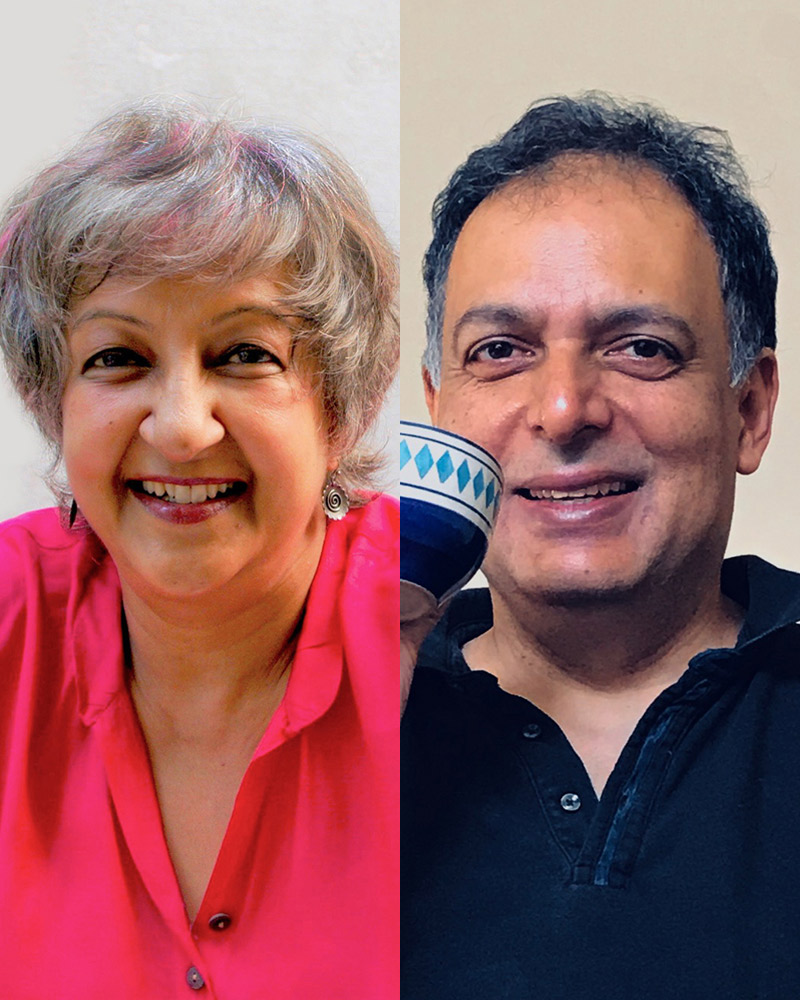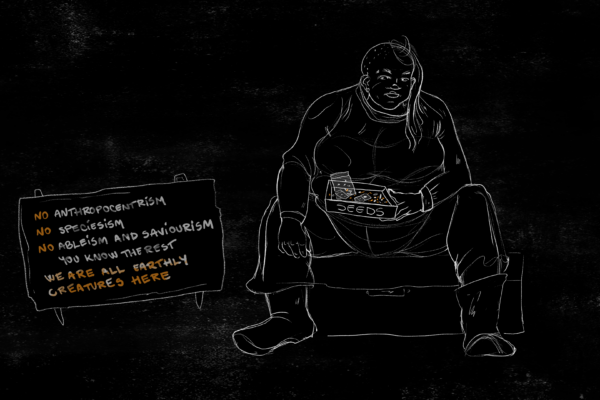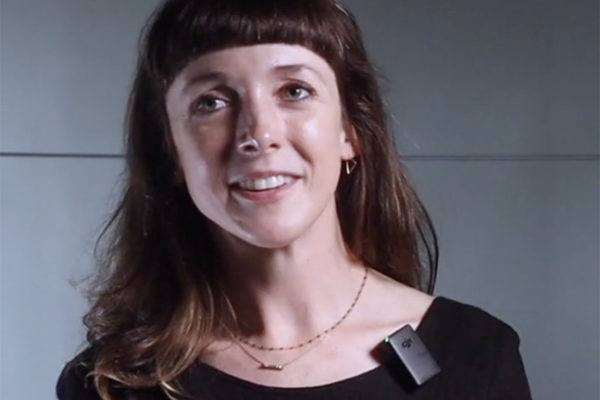CAF’s 2023 Navab Fellow Gauri Kasarla is an undergraduate student at Columbia University studying Art History and Visual Art. As an American with roots in Andhra Pradesh in south India, Gauri is interested in India’s social and political structure as well as the rising need for sustainability. She interviewed 2019 grantees Nirupama Sarma and Gautam Sonti about the challenges of making a film about veganism in India.
Gauri Kasarla: Can you briefly summarize what your film is about?
Nirupama Sarma: We want to provide a more nuanced, secular, and inclusive understanding of what the animal rights movement, and the vegan movement in particular, is about, to mainstream the issue in India as a legitimate and broader social justice issue.
The idea for the film was born in the wake of many attacks on minorities in India. Lynchings, as they were referred to—for possessing beef, being suspected of eating beef, or transporting cattle—caught the headlines. As secular and progressive people, we were horrified by these attacks—even while we are also animal rights activists. In India, the issue is seen as a binary. You’re either right wing, Hindutva, and oppose the killing of cows and eating of beef, or you are left-liberal, oppose state diktats on dietary practices, and uphold the rights of marginalized communities. We, on the other hand, are different because we strongly condemn these attacks on minorities, while we also work to protect the lives of all animals, not just cows.
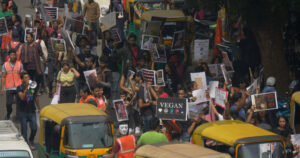
A protest by vegan activists in India.
Through this film, we want audiences to recognize and acknowledge the sentience of non-human animals, and the extreme violence inflicted on them through the entire system of artificial and forced breeding, rearing in unnatural and captive conditions, and eventual slaughter. If you believe in social justice, and oppose violence against women, marginalized communities, and sexual minorities, it is equally incumbent on you to also recognize and oppose the terrible violence towards animals in the name of food. Animal rights is a much wider domain, but the majority of animals are abused and exploited in the name of food.
Gautam Sonti: I’m empathetic to animal rights issues and I’d be flattered to be called an activist, but the truth is that I don’t actively participate in protests. My actions towards changing things are limited to making films, but perhaps they’re films that change people.
Our film arose out of two concerns. One—for minority communities, specifically Muslims and Dalits, who are being attacked under the guise of cow protection. The right wing uses food practices, specifically beef eating, as an excuse to lynch minorities and marginalized communities. The other concern is for the animals that are subjected to the most inhumane treatment in the production of our food. Left leaning and liberal minded people, who are involved in other social justice issues, tend to resist the idea of animal rights. In other parts of the world, animal rights activists may be ridiculed or ignored, but rarely abhorred as they are in India. Our film is an invitation to people working on other social justice issues to embrace—or at least accept—animal rights as a legitimate social justice issue.
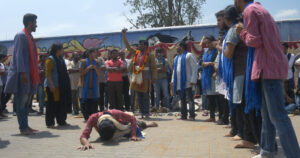
Dalits protest the government ban on beef through a street theater performance in Bangalore.
Nirupama: We are equally as alarmed by the lynchings as we are by the beef parties that are thrown by the left-liberal, progressive activists to protest these bans. Because then, the animals are just reduced to pawns in the game. Vegan activists face a lot of derision in India among liberal activist circles; very different from the situation in the US, where being progressive is synonymous with choosing to be vegetarian/vegan out of concern for animal rights/welfare, and/or climate change, and environmental sustainability. Here, in India, about 28 percent of the population is vegetarian—mostly by birth, because they have been born into “upper-caste” families that are traditionally vegetarian. Given the liberal discourse to dismantle casteism (rightfully so), vegetarianism is unfortunately conflated with casteism, by default. And veganism is seen as an elitist fad, a new-fangled version of caste-based vegetarianism. We vegan activists are forced to contend with a lot of negativity around our dietary choices—and need to clearly establish ourselves as a secular progressive movement—for animals, for people, and for the planet.
Gauri: You started working on the film in 2018. How has the film’s focus shifted as you continued working on it, especially through the pandemic?
Gautam: We had shot half of the film, then the pandemic hit, so we stopped filming. We started looking at the footage and doing some initial editing. This helped us to see what was missing. During the pandemic, since many people were spending time online, Dalit and Muslim vegans became a lot more visible. This gave us the chance to connect with Ankur and Sanchita, a couple of young Dalit vegan activists, and also Sana, a Muslim vegan activist. The film is not a character-driven documentary, so there isn’t a single protagonist, but amongst the many characters in the film, Sanchita now occupies more screen time than anyone else. I’m vegan now, but she’s far more uncompromising than I am. The Dalit vegan movement grew during the pandemic—from about 2020/2021 onwards. So we were lucky that we were forced to wait and be able to meet and include her, Ankur, and Sana.
Nirupama: When we first embarked on the film we wanted to cover the issue from all dimensions, including the health and environment/climate change arguments for veganism. However, during the Covid lull we decided to focus on the ethical argument (though we do reference other dimensions), and finding strong vegan voices from marginalized communities (both Dalit and Muslim) bolstered this focus. Earlier, our film featured leaders of social justice movements in India and even globally, but they were all somewhat privileged, and we felt the need to include voices from marginalized communities. Now the film is far more inclusive, with a range of voices questioning the status quo, drawing parallels between the oppression of human and non-human animals, and urging a new path going forward.
Gauri: I know you briefly touched on this earlier, but has the film and its subject matter been affected by the current political situation in India?
Nirupama: Yes, definitely.
Gautam: As a result of the current political situation, we think that the film will certainly interest our imagined audience—liberal-left leaning people who are concerned about other social justice issues. It can be far more inclusive than that, but that’s our first audience—those whom we have in mind while making the film. All kinds of people are liberal, so it’s not a restrictive definition. The film is not addressed to a ‘hardcore’ right wing person. But nor is it primarily against the right wing. If anybody watches it with some attention, they’ll realize that quickly.
Nirupama: In terms of the current political situation, the issues are getting far more polarized. You’re either Hindutva or you’re a “sickular,” anti-Hindu “libtard.” And issues such as animal rights and veganism threaten everyone—the cow-worshipping, milk-celebrating, right-wing Hindu, as well as the beef-celebrating left-liberals who’re constantly accusing vegans (and vegetarians) of being privileged and casteist and undermining the movement as a whole.
For example, they demand, “How can you talk about veganism when there is so much hunger and malnutrition in India?!”—little knowing that actually, a plant-based diet could be one of the key solutions to such problems, as well as for environmental sustainability and mitigating climate change. This kind of suspicion and derision of an emerging movement, I guess, is not new. Even in the case of the women’s movement and the LGBTQ movement in India, initially the reaction was, “Really? Is this important given so many bigger issues, such as poverty?!”
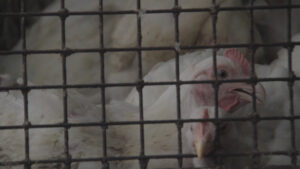
Gauri: Because you’re presenting the film from a secular perspective, do you think more people will be receptive to it?
Gautam: Amongst the liberals, certainly. It’s true that the current political situation does make people of this leaning wary of an issue of this kind. However, because of the polarization in society, people may actually be willing to hear us out, since they will realize that we don’t belong to the Hindutva camp. We let it be known early in the film that we lean towards liberal-left. I think there is a slightly greater acceptance of animal rights issues or veganism today than there was seven years ago, when we started working on the film.
Nirupama: Despite us being secular, getting someone to edit the film was very difficult because most people working on documentary films are left-leaning. One of the editors we were keen to work with declined, only because he was anxiety-stricken: “What will my friends think if I edit a film on this issue?” he asked. Fortunately, and interestingly, the editor we eventually moved forward with is a Muslim woman, who’s worked on other social issues. She’s not vegan, and we’ve had many difficult yet interesting discussions, which have only enriched the film.
Gauri: I know you can’t specifically predict what the reaction to your film will be, but what do you imagine the response will be among Indians?
Nirupama: I think it’s going to be seriously unsettling for our audiences, a lot of cognitive dissonance—and perhaps our social lives will go plummeting 😊. We don’t expect audiences to turn vegan overnight, but at least the film will prize open discussion about what is a very sensitive and divisive issue, especially in India. And through these discussions, we hope there will be normative shifts in how we view our non-human fellow travelers, and how we might engage in more gentle, ethical, and sustainable ways to live on this planet.
Gautam: I think it’ll generate a lot of controversy. Of course, there are people who will completely diss it before they see it. With any issue, there are people who refuse to engage. They just dismiss ideas that go against certain biases that they have. But I think the film will unsettle many other people. They will be more receptive after watching the film. And though it’ll be a challenge to get it screened widely—because groups who screen films will hesitate to screen it—I think we’ll manage. I expect it’ll change the debates around veganism in India. We have a long section on the exploitation of animals in the production of milk, a food that is consumed by people of all religions in India. That, in itself, suggests that we don’t come from a position of Hindu dominance or Hindu oppression.
Nirupama: Really, through this film we are “coming out of our closets” as vegan and animal rights activists. In 2007, when I was vegetarian, not vegan, I struggled to share with my liberal-minded friends
that I was vegetarian not out of habit but out of ethical concerns. One couldn’t disclose that easily. It’s changed a bit now, for sure, as Gautam said, but I think the film will help facilitate discussions around the issue, and help provide it with a much-needed legitimacy.
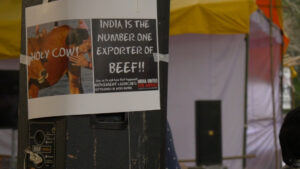 Gautam: I’d become vegetarian about 25 years ago, but I wasn’t vegan before I started working on this film. Even if I had become vegan, I’d have taken pains to conceal the fact, if I hadn’t started on the film.
Gautam: I’d become vegetarian about 25 years ago, but I wasn’t vegan before I started working on this film. Even if I had become vegan, I’d have taken pains to conceal the fact, if I hadn’t started on the film.
I’m sure there are other people who will take courage in hearing from vegans with political perspectives that are similar to theirs.
Nirupama: Over the years, ever since I became a vegan activist, interactions with some of my non-vegan friends have been marked by uncertainty and discomfort. One of my friends, a well-known activist, even turned around and accused me, “You, too, Niru!?” as if I had betrayed some larger cause. There’s a strong sense of vegan stigma in liberal circles. . . . I hope this film encourages many out there who feel for such issues but are hesitant to become vegan due to uncertainty, fear of ridicule, etc.
Gauri: The contrast that you are describing between “coming out” as vegan in India as opposed to America is interesting because it seems like in America, a lot of people pride themselves in being vegan—as they should. They can speak about it publicly to inspire other people, versus, for you, it seems challenging to put yourself in this position.
Gautam: Yes, vegetarianism has traditionally been the diet of privileged castes and unfortunately, veganism is seen as the new vegetarianism, though that’s a completely false equivalence. Because of this association, veganism in India is seen as an extension of the oppression of minority and oppressed communities.

A protest by vegans outside Burger King.
Nirupama: When in truth, there’re so many reasons to go vegan and eat lower on the food chain. You’re actually reducing your carbon footprint and it’s better in terms of environmental sustainability. Instead of diverting agricultural land, and precious resources such as water, for growing food for livestock (which are then eaten by humans), you could use the same land to grow food for far more people so that everybody is better fed and nourished.
Gautam: The ratio, on average, is one to five—for the conversion of plant matter to animal matter. The same piece of land can feed five times as many people if you feed people directly rather than animals, which people then feed on. It’s a complicated calculation in India, because many herbivorous animals dine on shrubs and plant matter that humans don’t eat. But it cannot be contested that you can feed many more people if you grow crops rather than animals.
Nirupama: Also, the people who’re actually consuming the highest amounts of meat and dairy are wealthy, upper-class urbanites; it goes with the whole cycle of consumerism and greed. In recent decades, post liberalization, as India gradually became classified as an emerging economy and the social fabric started loosening up, an increasing number of people, including “cultural vegetarians” started to eat meat, which was aided by KFC and McDonald’s. Eating meat became a sign of modernity, being part of a larger global community.
One of the eminent right-to-food activists we interviewed for our film shared how the rural poor—who under normal circumstances may have killed and eaten a goat occasionally—are increasingly forced to sell their animals via middlemen for consumption in urban areas because they are so cash-strapped. So, there’s a huge inequity there that most people don’t seem to recognize. And veganism is not about almond milk and tofu—even if it is unfortunately projected that way. It is about returning to a more minimalistic and sustainable lifestyle.
Gauri: Is there anything that you would like non-Indians to take away about India from viewing the film?
Gautam: I’d say it could give them insight into the social situation over here and the complexities of being vegan in India. The film can have universal resonance, but because the situation here is so complex, I would say that the larger audience would be Indians or people who have some connection to India.
Nirupama: I would like Non-Resident Indians (NRIs) to recognize and appreciate how difficult it is to engage in vegan advocacy in India, and how much we need their support in the animal rights and vegan communities. Regular commercial animal-derived products like bovine milk get subsidized by the government, so vegan alternatives are unable to compete because of pricing. We need policy advocacy to change that, and far more investment in the production and marketing of plant-based products, to generate demand and benefit from economies of scale. I would imagine that a lot of NRIs are possibly equipped to do that kind of thing. Activists also need support to conduct effective advocacy—we’re up against billion-dollar industries with serious advertising and marketing clout!!
Gauri: It seems that so much money is in the dairy industry in India, but it would help if some of those resources could be used for supporting vegan products instead.

A statue of the “Amul girl.”
Gautam: Right. Animal agriculture and the production of milk continue to be supported in different ways by the government. That kind of support is not extended to vegan products, though they need it to establish a market. At the moment, the economies of scale don’t work in favor of vegan products. Government policies not only don’t promote vegan products, they tend to discourage their production. Take Amul for instance—it’s a milk cooperative—the government has a say in how it’s run. Amul even objected to the use of the word “milk” to describe non-dairy equivalents.
Nirupama: Thanks to the history of the dairy cooperative movement, Amul is synonymous with India, nationalism, and progress. And they have phenomenal branding—the Amul girl [see image], and this slogan, “Amul—the Taste of India.” How do you compete with them, or expose what they do?! Some young vegan activists posted on social media about Amul and the condition of dairying cows. Immediately, Amul threatened them with defamation charges to the tune of a few million, and released huge ads in leading papers supposedly “debunking myths” about dairy. So naturally, these activists were completely intimidated and forced to delete all that content and step back. . . . How can we talk about these realities when we’re threatened like this?!
There’s a fundamental moral and ethical argument here which ought to communicate itself to everyone. It’s really outside of these national boundaries. We would hope that audiences, including NRIs, recognize this veganism is not about religion and caste, being traditional or modern. It is beyond that: a more ethical and sustainable way to move forward.
Nirupama Sarma and Gautam Sonti are co-filmmakers of a documentary expected to be released in 2024. Nirupama is an animal rights activist, with many years of experience as a strategy and evaluation consultant in the non-profit sector across Asia and Africa. For further information please write to nirupama.sarma@gmail.com. Gautam is a freelance documentary filmmaker. For more about his films: gautamsonti.com.


